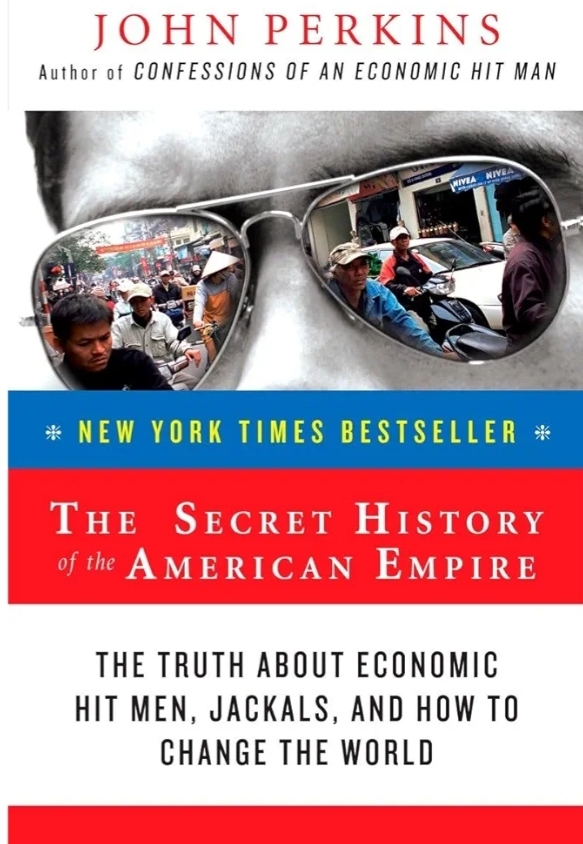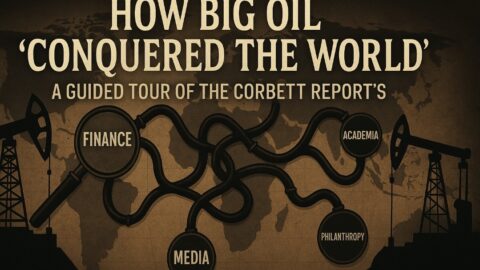John Perkins’ The Secret History of the American Empire: The Truth About Economic Hit Men, Jackals, and How to Change the World is a sequel to his groundbreaking work, Confessions of an Economic Hit Man. In this book, Perkins expands on his earlier revelations, offering deeper insights into the tactics used by multinational corporations, financial institutions, and governments to exploit developing nations for economic gain. He also provides actionable ideas for creating positive change. Below is a detailed breakdown of the book:
Key Themes and Content
The Economic Hitman (EHM) System
- Perkins elaborates on his personal experiences as an EHM, explaining how he and others were tasked with persuading developing countries to accept massive loans for infrastructure projects.
- These loans, often unrepayable, ensured that the countries remained in debt and under the control of powerful corporations and governments.
- He describes the symbiotic relationship between EHMs, multinational corporations, and global financial institutions like the IMF and World Bank.
“Jackals” and Covert Operations
- The book explores how “jackals,” or covert operatives, are employed when EHMs fail. Jackals engage in destabilization tactics, coups, or even assassinations to ensure compliance with U.S. or corporate interests.
- Perkins provides examples of leaders who resisted these pressures and faced dire consequences, such as Jaime Roldós (Ecuador) and Omar Torrijos (Panama).
Case Studies from Around the World
- Perkins examines real-world examples of how the EHM system has operated globally:
- Africa: The exploitation of natural resources, especially oil and minerals, and the deliberate fostering of conflicts to secure control over these assets.
- Asia: The role of globalization in displacing communities, particularly in Indonesia and Southeast Asia.
- Latin America: U.S. interventions to control resources and suppress leftist movements, with a focus on the Panama Canal and oil-rich regions like Venezuela.
- Middle East: The manipulation of oil economies and the destabilization of governments that do not align with Western interests.
The Role of Corporatocracy
- Perkins argues that a “corporatocracy,” a coalition of corporations, banks, and governments, orchestrates global economic policies for its benefit.
- This system undermines democracy and sovereignty in developing nations, perpetuating inequality and exploitation.
Environmental and Social Consequences
- The book highlights the devastating impact of corporate-driven development on the environment, including deforestation, pollution, and climate change.
- It also discusses the social toll, such as poverty, displacement, and the erosion of local cultures.
How to Change the System
- Perkins emphasizes the power of individuals to effect change through awareness and action.
- He advocates for ethical consumerism, grassroots activism, and pressure on corporations to adopt sustainable and equitable practices.
- The book ends with a call to action for readers to challenge the status quo and work toward a more just and sustainable world.
Key Takeaways
Systemic Exploitation
- Developing nations are deliberately kept in cycles of debt and dependency, ensuring their resources and labor benefit multinational corporations rather than local populations.
Covert Power
- When economic strategies fail, covert operations are employed to remove or neutralize opposition, demonstrating the lengths to which the corporatocracy will go to maintain control.
Global Impact
- The effects of these practices are felt worldwide, contributing to economic inequality, environmental degradation, and political instability.
Hope for Change
- Perkins provides examples of successful resistance movements and highlights the growing power of informed citizens and grassroots organizations.
Writing Style and Approach
- Perkins blends personal anecdotes with detailed research, creating a narrative that is both engaging and deeply informative.
- He writes with urgency, aiming to awaken readers to the realities of global exploitation while inspiring them to take action.
Reception and Legacy
- The book has been praised for its bold revelations and its ability to connect global economic policies with personal stories.
- Critics have noted its sometimes anecdotal nature, but its impact lies in shedding light on systemic exploitation and inspiring activism.
Conclusion
The Secret History of the American Empire is a powerful exposé of how economic power is used to control nations and resources, perpetuating inequality and environmental destruction. Perkins not only reveals the dark side of globalization but also offers hope and practical strategies for creating a more equitable and sustainable world. It is a must-read for anyone interested in understanding the forces that shape our global economy and how we can challenge them.







